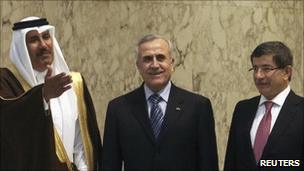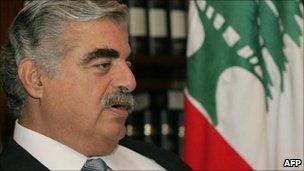Hariri tribunal: Turkey and Qatar end Lebanon mediation
- Published

Days of talks involving foreign mediation have failed to achieve a breakthrough
Ministers from Turkey and Qatar have suspended efforts to mediate in the political crisis in Lebanon.
Two days of talks with rival political groups have not made progress.
Last week, the Lebanese government collapsed because of a dispute over the UN backed tribunal investigating the murder of former PM Rafiq Hariri.
Sealed indictments have been issued. It is believed these point to the involvement of Hezbollah in the killing.
Earlier in the week the Saudi foreign minister pulled out of his mediation effort, warning of a dangerous situation in Lebanon.
'Reservations'
Now the Qatari Prime Minister Sheikh Hamad bin Jasim al-Thani and the Turkish foreign minister Ahmet Davutoglu have also left Lebanon.
Though they did issue a statement that suggested they had made some progress.
"[Our] efforts resulted in a working draft that takes into account political and legal demands to resolve the current crisis in Lebanon based on the Syrian-Saudi initiative," the statement said, according to AFP.

The 2005 assassination of Rafik Hariri cast a long shadow over Lebanese politics and society
"But given certain reservations, we decided to suspend efforts in Lebanon for the time being and to leave Beirut in order to consult with our leadership," the statement went on.
According to reports, the Syrian-Saudi initiative calls for Lebanon to disavow a UN tribunal investigating the Hariri assassination. In return Hezbollah would offer unspecified guarantees about its weapons.
'Plot'
Hezbollah has vowed to retaliate if, as expected, its members are implicated.
Last week, the powerful Shia movement brought down the government of Prime Minister Saad al-Hariri - Rafik Hariri's son - over his refusal to denounce the tribunal and cut off part of its funding.
Hezbollah has denounced the UN-backed probe, calling it a US-Israeli plot, and denies any involvement in the killing. But supporters of the tribunal say it is a landmark step towards justice in the country.
On Monday, the prosecutor of the Hague-based Special Tribunal for Lebanon submitted its first indictment in the case, but the names of the suspects will not be revealed unless charges are laid.
Correspondents say a protracted crisis is likely to follow, and there are widespread fears that it could lead to the type of sectarian violence last seen in May 2008, which left 100 people dead and brought the country close to civil war.